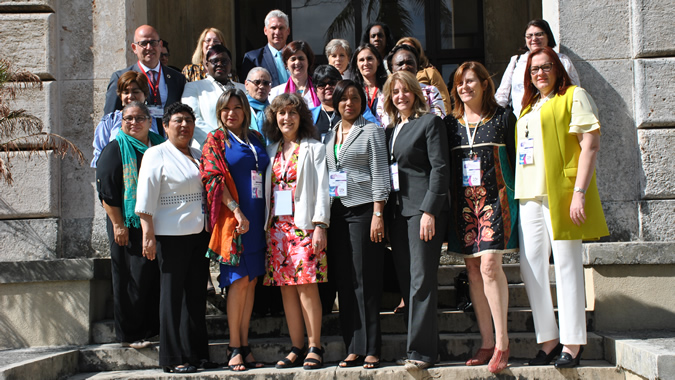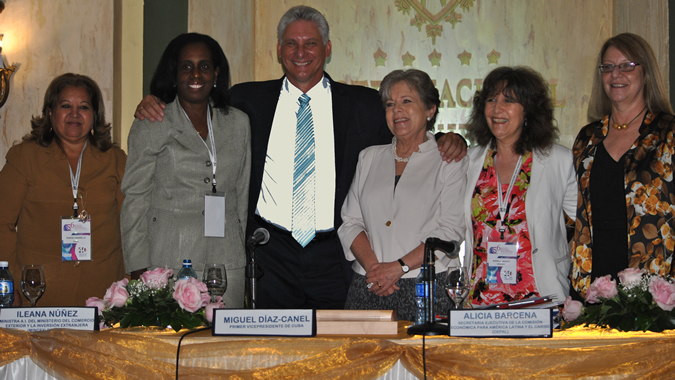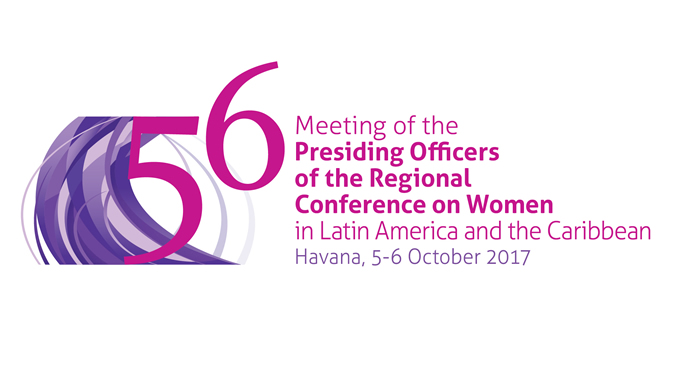Authorities on Women’s Issues Agreed to Continue Strengthening the Institutional Architecture for Advancing toward Gender Equality in the Region
Work area(s)
ECLAC’s next Regional Conference on Women – which will take place in 2019 in Santiago, Chile – will focus on the achievement of women’s economic autonomy, which is key for enabling them to exercise the rest of their rights, according to officials.

Authorities from mechanisms for women’s advancement in Latin America and the Caribbean gathered in Havana, Cuba today agreed to continue strengthening their countries’ institutional architecture as well as to consolidate the dialogue and regional cooperation aimed at moving toward gender equality in the region.
On October 5-6, the Fifty-Sixth Meeting of the Presiding Officers of the Regional Conference on Women in Latin America and the Caribbean was held at the Hotel Nacional de Cuba. It was organized by the Economic Commission for Latin America and the Caribbean (ECLAC) and the government of Cuba, through the Federation of Cuban Women.
At this event, attended by international officials and representatives of civil society as well, participants celebrated the 40th anniversary of the Regional Conference on Women, which is one of ECLAC’s nine subsidiary bodies.
The speakers at the meeting’s closing session in Havana were Alicia Bárcena, Executive Secretary of ECLAC; José Ramón Balaguer Cabrera, Head of the International Relations Department of the Central Committee of Cuba’s Communist Party; Mariella Mazzotti, Director of the National Women’s Institute (INMUJERES) of Uruguay; Ileana Núñez, Cuba’s Deputy Minister of Foreign Trade and Investment; and Teresa Amarelle, Secretary General of the Federation of Cuban Women.
In addition to thanking all the people who made possible the meeting of the Presiding Officers, and the Regional Conference’s 40 years in existence, Bárcena highlighted the approval in 2016 of the Montevideo Strategy for Implementation of the Regional Gender Agenda within the Sustainable Development Framework by 2030, which she described as the roadmap that identifies the critical cruxes of gender inequality and provides concrete policy guidance.
At a difficult time for global multilateralism, “we tell the region and the world that it makes sense to forge collective spaces for addressing these challenges together, men and women,” she stated. “There are countries that have gender equality plans, but a further step must be taken: incorporating them into national development plans and budgets.”
Mazzotti, meanwhile, noted that “the Regional Conference on Women represents an area of joint work, where step by step countries are constructing an idea of the kind of democracy and the type of social relations that we want.” She added: “Countries cannot build that gender democracy, that parity democracy that we all want, in isolation.”
Ileana Núñez also lauded the Regional Conference’s four decades of uninterrupted work: “Since the first conference was held in Havana (in 1977), this has been the main forum for following up on the action plan and negotiating a regional gender agenda.”
The Cuban Deputy Minister also thanked “the high attendance to this meeting, especially at a time when many of our countries have been affected by natural disasters and are in the process of recovering.”
In the Cuban capital, officials presented a repository of legislation on migration and gender prepared by ECLAC’s Gender Equality Observatory for Latin America and the Caribbean, in conjunction with the International Organization for Migration (IOM).
The repository includes 94 national legislative regulations from 21 countries in Latin America and the Caribbean: Argentina, Bolivia, Brazil, Chile, Colombia, Costa Rica, Cuba, the Dominican Republic, Ecuador, El Salvador, Guatemala, Haiti, Honduras, Mexico, Nicaragua, Panama, Paraguay, Peru, Puerto Rico, Uruguay and Venezuela.
The laws contemplated contain explicit references to migrant women, adolescents or girls; prohibit all forms of discrimination based on gender and on migration status; and insist on the need to respect the specificities of gender and migration status.
Finally, the ministers agreed that economic, productive and fiscal policy at the service of equality will be one of the main topics at ECLAC’s next Regional Conference on Women, which will take place in 2019 in Santiago, Chile.
Related content

Commemoration in Havana of 40 Years of Advancement of Women’s Equality and Rights in the Region with a Focus on Pending Challenges
Miguel Díaz-Canel Bermúdez, First Vice President of the Councils of State and Ministers of Cuba, and Alicia Bárcena, ECLAC’s Executive Secretary, led the inauguration of the Fifty-Sixth Meeting of…

Regional Conference on Women Organized by ECLAC Commemorates 40th Anniversary in Havana
On October 5-6, 2017, the Fifty-Sixth Meeting of the Presiding Officers of the Regional Conference on Women in Latin America and the Caribbean will be held in Cuba’s capital.
Subregional headquarter(s) and office(s)
Type
Country(ies)
- Latin America and the Caribbean
Related link(s)
Contact
Public Information Unit
- prensa@cepal.org
- (56 2) 2210 2040
